On July 6, 2020, gunmen killed prominent Iraqi security analyst Husham Al-Hashimi near his house in Zayona district, northeast Baghdad, which is an area that is heavily controlled by the Iran-backed Kata'ib Hizbullah faction (KH).[1]
Al-Hashimi was a well-known researcher who often advised the Iraqi government and western research institutes on their anti-terrorism efforts including Shi'ite militias. He was an outspoken critic of sectarian and ethnic divisions in Iraq and often pointed fingers at Iran-backed factions. He was a key source of information for the public before, during, and after the Iraqi Counter Terrorism Service's (ICTS) recent raid on KH in Al-Dora, southern Baghdad.[2]
Before his death, he was working closely with Prime Minister Mustafa Al-Kadhimi in addition to his role as a member of the Iraq Advisory Council, a panel of prominent experts and former policymakers.
Footage circulated on social media showed Al-Hashimi parking his car when a masked gunman shot him at close range. The footage also shows three other masked men on two motorcycles, waiting for the killer to carry out the assassination before they all fled. The footage then shows Al-Hashimi's family rushing to pull him from the car, but local reports said that he was shot in his head using a silenced weapon and died in the hospital.[3]
The assassination took place during the curfew hours late at night. Al-Hashimi was on his way home after he took part in an interview with a local television station. As a TV contributor, Al-Hashimi had an authorized pass that allowed him to drive during after curfew. No group has yet officially claimed responsibility for Hashimi's killing.
Moments before he was killed, Al-Hashimi, who had more than 100,000 followers on Twitter, tweeted criticizing the sectarian and ethnic divisions in Iraqi politics. "Iraqi divisions are dominated by: 1. The quota system that the [U.S.] occupation brought... 2. The dominant parties: Shi'ite, Sunni, Kurdish, Turkmen. that want to assert their gains through division. 3. Religious parties that replaced partisan rivalry with sectarian rivalry."[4]
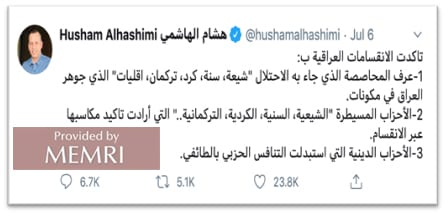
Al-Hashimi's last tweet (Source: Twitter, July 6, 2020).
A few hours earlier, he shared a tweet that he later deleted. In that tweet he asked followers whether they think that targeting Baghdad International Airport was an act of resistance or an act resembling the actions of the Islamic State (ISIS), hinting that the so-called "resistance factions" are no different from terrorist groups such as ISIS. Seventy-nine percent of his followers said the act resembled an ISIS action.

Al-Hashimi's deleted tweet (Source: Twitter, July 6, 2020).
Al-Hashimi Received Death Threats
Several hours after the assassination, Ghaith Al-Timimi, an Iraqi activist and leader of Mowatanion Iraqyion ("Iraqi Citizen") Movement said in a live interview with Al-Hurra TV that Al-Hashimi had contacted him a few months before his killing, saying that he had received a serious death threat from KH. Al-Timimi showed viewers WhatsApp messages he exchanged with Al-Hashimi in which the latter was asking for an advice on how to deal with that serious threat that he said a "reliable messenger" had passed to him.[5]
Al-Tamimi stressed that he had more documents that prove that KH had killed Al-Hashimi, adding that he is willing to hand them to Prime Minister Al-Kadhimi. Al-Tamimi posted the content of his messages with Al-Hashimi on his Twitter account, saying that he had promised Al-Hashimi that he will expose his killers if they fulfilled their threat.
He also added that he himself was threatened as he was doing an interview by the "same party" after he revealed that he has documents that incriminate the militias that carried out the attack against Al-Hashimi. Al-Timimi said that "Mohammad Baqer Soleimani, a bodyguard of the former IRGC Quds Force Commander, General Qassim Soleimani," was sending these threats. He concluded by noting that Al-Hashimi had informed Al-Kadhimi of the threats he received.
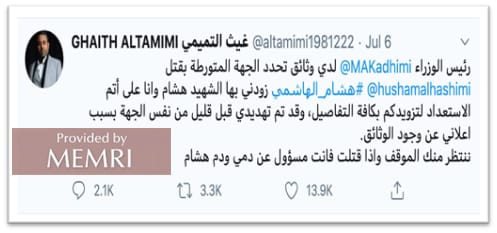
Al-Timimi's tweet (source: Twitter, July 6, 2020).
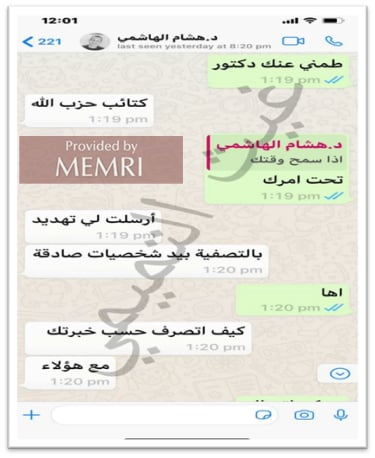
Al-Timimi's and Al-Hashimi's messages on WhatsApp (source: Twitter, July 6, 2020).
Earlier, on June 26, Al-Hashimi shared a tweet about the ICTS's raid on KH that read: "None of the detainees were released yet from the ICTS headquarters," and that "attempts by the Popular Mobilization Units (PMU) leadership to free them were rejected by the judge." In response, an account with the username Abu Ali Al-Askari, a nom de guerre for KH commander, commented: "Would you like us to bring you to the Katai'b [i.e., KH] headquarters to sit with them [the detainees] so you can be sure.?"[6]
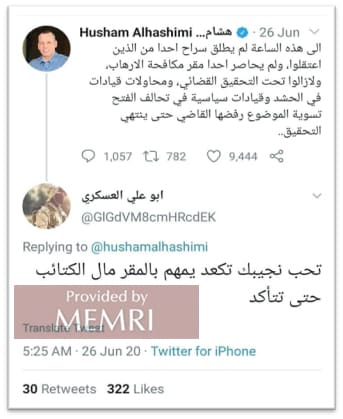
Abu Ali Al-Askari's alleged comment on Al-Hashimi's tweet (source: Twitter, June 26, 2020).
It is noteworthy that in April, Al-Hashimi exposed in a tweet the identity of Abu Ali Al-Askari when he tweeted a photo of him, saying that his real name is "Hussein Mo'nis and he is as a member of the KH Shura council in addition to his work as a security and military commander." Al-Hashimi also claimed that the latter's controversial tweets were behind political crises between the Iraqi government and "the non-state actors who control the state."

Al-Hashimi's tweet exposing Abu Ali Al-Askari's identity (source: Twitter, April 3, 2020).
On June 23, Al-Hashimi exchanged messages with a MEMRI source for research purposes and mentioned in passing that he had been "receiving dozens of death threats every day." He also shared a screenshot that he had said highlights a "sample of these threats." The screenshot showed a Twitter user by the name "HD Al-Junobi [The HD southerner]," commenting on a tweet by Al-Hashimi criticizing supporters of the "Katuchya Cell" for threatening the stability and security of the Iraqi state. HD Al-Junobi commented by saying: "Your voice is becoming loud against the honorable resistance who wants to avenge for the victory martyrs [Qassem Soleimani and Abu Mahdi Al-Muhandis]. You probably have guarantees from the [U.S.] Embassy and Al-Kadhimi to protect you."
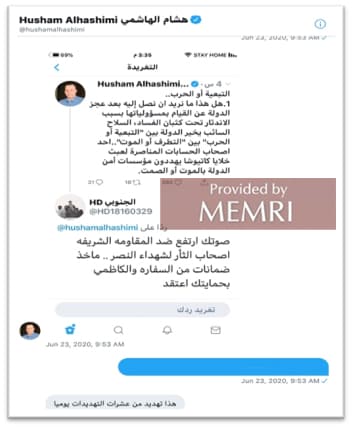
Messages by Al-Hashimi with a MEMRI source.
A preliminary review by MEMRI of the user's accounts showed that most of his tweets extend support to the Iranian regime and its Shi'ite proxies in Iraq, with obvious anti-U.S. and anti-Iraqi government sentiment. The account follows the so-called "resistance factions" and media outlets affiliated with Iran-backed factions. The user discredited Iraqi officials who accused KH of killing Al-Hashimi or condemned his assassination.[7]

HD Al-Junobi's tweets condemning those condemning the killing of Al-Hashimi (source: Twitter, July 7, 2020).
Media Campaign Against Iraqi Journalists And Government Media Advisors
During the last ten months, independent journalists in Iraq have come under attack by Shi'ite factions affiliated with the PMU, in particular KH. This campaign has intensified following Al-Kadhimi's appointment as prime minister, especially after he assigned several of them as advisors.[8] On July 4, two days before Al-Hashimi's assassination, social media accounts affiliated with Iran-backed PMU circulated a poster mocking Iraqi Prime Minister Al-Kadhimi, his Spokesperson Ahmad Mulla Talal, Chief of Staff Ra'id Jouhi, and three outspoken media figures: Hassam Al-Haj from Sharqyia TV, Nabil Jassim from Sharqyia TV, and the assassinated analyst Al-Hashimi.[9]

Poster circulated by PMU social media accusing Al-Hashimi, right, of being part of Iraqi government propaganda (source: twitter, July 5 2020).
In a June 26 tweet he shared, Al-Askari accused journalist Mushraq Abbas, who is currently working as a media advisor for the prime minister's office, of orchestrating the ICTS's raid against KH.[10]
On the same day, the Al-Ahad satellite channel, which is affiliated with the Iran-backed Asai'b Ahal Al-Haq militia, aired an interview with Iraqi journalist Ahmad Abdul Sada, who is known for his support for Iran and its Iraqi militias. During the interview, Abdul Sada accused Al-Hashimi of promoting false information about the PMU and influencing Iraqi public opinion against KH through his recent tweets. He stressed Al-Hashimi's close relations with Al-Kadhimi and accused him of recruiting activists on social media to support the government. After Al-Hashimi's assassination, journalists and social media users accused Abdul Sada of singling out Al-Hashimi as a threat to KH.[11]
In the meantime, social media accounts affiliated with the PMU tried to shift the blame to ISIS. Their posts on Twitter, Telegram and Facebook over the past few days eulogized Al-Hashimi and circulated fake statements by ISIS, saying that the group has claimed responsibility of the attack. However, some accounts are still rejoicing the assassination.

A tweet by a militia supporter rejoicing at Al-Hashimi's killing that was later deleted. It reads: "Let him go to hell, he is a dog... he was one of the fiercest enemies of the resistance factions (source: Twitter, July 6, 2020).
In this regard, it is worth noting that ISIS, which once described Al-Hashimi as "Baghdad's new liar," rejoiced in his killing but did not claim responsibility for the attack. In its recent issue of Al-Naba' weekly, the group distanced itself from the assassination, saying: "Although no group has claimed responsibility for the assassination, fingers of blame were pointed at certain militias... Despite his strong relationship with the [Iraqi] government and U.S. institutions, this did not shield him from any of these [militias]."[12]

ISIS's Al-Naba' reported Al-Hashimi' Killing (source: Techhaven. July 9, 2020).
Official Reactions To Al-Hashimi's Assassination
The Iraqi Prime Minister's office issued a statement on July 7, eulogizing Al-Hashimi and pledging to bring his killers to justice. "The government vows to his killers that we will pursue them, so they are justly punished for their heinous crime."[13] On July 9, Al-Kadhimi visited Al-Hashimi's family and told his children that he will "do everything, as much as is in him, to pursue the killers," adding that their father was "an intellectual, a professional, and presented Iraq in its best form." [14]

Al-Kadhimi with Al-Hashimi's children (source: Twitter, July 8, 2020).
Iraqi government spokesperson Ahmad Al-Mulla Talal said during a July 8 press conference that "the party that killed the demonstrators is the same one that assassinated Al-Hashimi, and they will be brought to justice and the judicial authority." Talal added that the prime minister ordered an investigation committee to investigate the matter and promised to present the results of the investigation after the arrest of the perpetrators to the public opinion, whatever the price. Talal added that the government decided to name one of Baghdad's streets after Al-Hashimi. The spokesman also said that Al-Kadhimi released the commander of the First Division of the Federal Police who was in charge of the security of the area where the assassination took place, from his duty.[15] President Barham Salih issued a statement on the same day describing the assassination as a"villainous crime" against a "courteous, nationalist, decent researcher." He urged the authorities to find his killers and bring them to justice.[16]

Salih's tweet (source: Twitter, July 6, 2020).
In addition, a peaceful march by October 2019 protesters was held on July 8 in Baghdad's Tahrir square in honor of Al-Hashimi. Protesters held signs reading "they assassinated the voice of truth with a prejudiced bullet" and blamed the Iranian regime for Al-Hashimi's killing. Videos circulated on social media of TukTuk drivers[17] beeping their horns outside his home in a show of support to his family.[18]

Protesters mourning Al-Hashimi (source; twitter, July 8, 2020).
Militias' Reactions To Al-Hashimi's Assassination
The PMU issued an official statement on July 7 offering its condolences to Al-Hashimi's family and the Iraqi journalists, describing Al-Hashimi's killers as a "terrorist groups," and urging the "heroes" of the Iraqi security forces to pursue the killers. The statement highlighted Al-Hashimi's role in "exposing" the Islamic State (ISIS).[19]
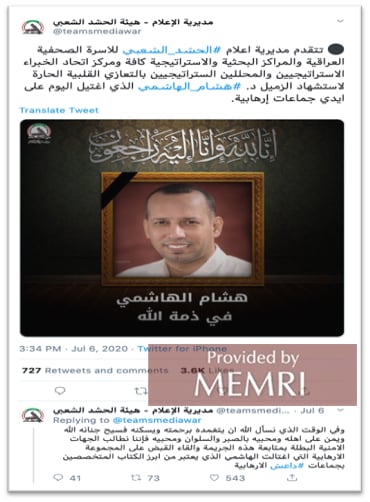
On July 7, Sabreen News, a Telegram channel affiliated with the PMU issued a statement on behalf of KH's senior military commander Abu Ali Al-Askari in which he offered his condolences to Al-Hashimi's family and denied that he was engaged in any conversation on Twitter with Al-Hashimi.[20] "He [Al-Hashimi] shared a tweet in which he indicated that it was posted by me but he did not present evidence and did not bother to contact me or my office to confirm the authenticity of that tweet," said Al-Askari, who accused "those who misled" Al-Hashimi of killing him. He further stressed that accusations that KH is behind the assassination are false, promising to sue those who spread these "fabrications." Interestingly, he signed the statement with his real name; Hussein Mo'nis, which Al-Hashimi exposed in April.
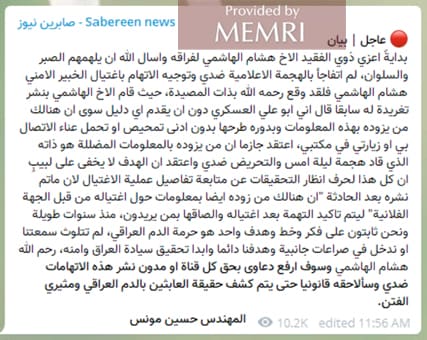
Statement by Hussein Mo'nis aka Abu Ali Al-Askari (source: Telegram, July 7, 2020).
Qais Al-Khazali, secretary general of the Asa'ib Ahal Al-Haq (AAH) militia, eulogized Al-Hashimi, noting his killing "will open the door for the return of the assassinations and security deterioration."[21] Other PMU commanders refrained from making any statement.

Conclusions
While Al-Hashimi's status as a prominent researcher with ample information on the Sunni insurgency and Shi'ite factions in Iraq made him a key target for these radical groups, it is his recent position as a security advisor to Prime Minister Al-Kadhimi that may have primarily contributed to his killing.
In recent weeks, Al-Hashimi had become more outspoken about the corruption inside the Shi'ite factions and the internal conflicts between PMU commanders following the death of Soleimani and Al-Muhandis, but we should also remember that his killing coincided with a showdown between Al-Kadhimi's government and KH following the June 26 raid in which Al-Hashimi fiercely defended the government's position and its efforts to restore the stature of the Iraqi state.
Over the past five years, Al-Hashimi had been an advisor to then prime ministers Haider Al-Abadi and Adel Abdul Mahdi, however, Iran-backed factions were highly alerted by his close relationship with Al-Kadhimi and his coordination with the latter to carry out reform inside Iraqi security institutions in order to meet the demands of the October 2019 protesters.
Al-Hashimi's killing highlights also the fear of Iran-backed factions that Al-Kadhimi's plan to curb their power and deprive them of financial resources might succeed, particularly with the support of people like Al-Hashimi, who had strong connections with the protesters and published valuable information about the structure and moves of the Iran-backed factions. His killing is meant to be a message to Al-Kadhimi, that these militant factions can clip his wings and easily reach his inner circle of aides without fear.
The assassination of Al-Hashimi puts more pressure on Al-Kadhimi, who publicly promised to take serious action to bring to justice the assassins and those behind the assassinations of many protesters. The Iraqi prime minister now has two options: either to turn a blind eye like former prime ministers did and as AAH leader Qais Al-Khazali advised in his televised June 26 speech.[22] Alternatively, he could confront Iran-backed militias despite all the risks involved.
Click below to see a MEMRI TV clip of AAH leader Qais Al-Khazali's June 26 speech.
*S Ali is a research fellow at MEMRI.
[1] Al-aalem.com, July 9, 2020.
[2] See MEMRI Inquiry & Analysis Series No. 1520, Iraq On The Path Of National Recovery From Iranian Hegemony – Part IV: Three Days In Baghdad: Al-Kadhimi's Raid On Iran-Backed Kata'ib Hizbullah (26-29 June), July 6, 2020.
[3] Alarabiya.net, July 7, 2020.
[4] Twitter.com/hushamalhashimi, July 6, 2020.
[5] Alhurra.com, July 7, 2020.
[6] Twitter.com/venus__f7/status/1280247274690543618, July 6, 2020.
[7] Twitter.com/HD18160329, last accessed July 10, 2020.
[8] See MEMRI Special Dispatch No. 8495 Shi'ite Militias Crack Down On Reporters, Activists Covering Anti-Iran Protests In Iraq, January 14, 2020.
[9] Twitter.com/HussamAlhaj4, July 5, 2020.
[10] Twitter.com/abualialaskary/status/1277554604968943622, June 26, 2020.
[11] Youtube.com/watch?v=Fs4h64fLP_o, June 26, 2020.
[12] Techhaven.to/channel/publisher_islamic_state, July 9, 2020
[13] Twitter.com/IraqiPMO, July 7, 2020.
[14] Youtube.com/watch?v=spur25BVrjY, July 9, 2020.
[15] Al-iraqinews.com/archives/43319, July 8, 2020.
[16] Twitter.com/BarhamSalih, July 8, 2020.
[17] See MEMRI Inquiry and Analysis Series No. 1487 The Iraqi Newspaper 'Tuktuk' – The Voice Of The Demonstrators At Baghdad's Tahrir Square, In The Shadow Of Censorship And Shutdowns Of Access To Internet, November 21, 2019.
[18] Alaraby.co.uk, July 7, 2020.
[19] Twitter.com/teamsmediawar, July 6, 2020.
[20] Telegram, sabreenS1/9948, July 7, 2020.
[21] Twitter/QaisAlKhazali, July 7, 2020.




